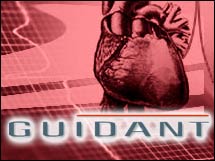|
Guidant: To the victor goes... the bill
One thing's for sure about the Boston Scientific/Johnson & Johnson bidding war: The winner will pay too much.
(FORTUNE Magazine) - While the outcome of the epic battle between Boston Scientific and Johnson & Johnson to buy Guidant was still in doubt as FORTUNE went to press, two things seems certain: The company that wins will be paying too high a price, and the risks of prevailing in the bidding war are far higher for Boston than for J&J. Put simply, Boston is betting the company. The $27 billion that Boston is offering is larger than its own $20 billion market capitalization. By contrast, J&J boasts a market cap of $186 billion, so it could compensate for poor performance at Guidant with good returns on thousands of other products. Either way, the victor will be buying damaged goods. In the past year Guidant's two main products -- defibrillators that use electric shocks to restart faltering hearts, and pacemakers that regulate heartbeats--have malfunctioned, causing the death of several patients and miring the company in lawsuits, recalls, and bad publicity. Guidant has seen its market share drop from around 35% to just over 20%.
Given all that, let's examine the economics of the deal. What hurdles does Guidant's big pricetag set? J&J CEO William Weldon was still deciding whether to raise his $24 billion bid. But for the sake of argument, we'll focus on Boston Scientific's bid. Boston plans to sell part of Guidant to Abbott Laboratories for $4 billion. It's also agreeing to pick up the $705 million breakup fee that Guidant would owe J&J (Research) for selling to another suitor. So Boston would end up paying a bit less than $24 billion. Guidant (Research) is now earning around $300 million a year from its heart devices. That means if Boston carries the day with its latest bid, it would be paying a scary 80 times Guidant's earnings. Now consider the best-case scenario, courtesy of Matt Dodds of Citigroup. Dodds reckons that by 2007, Guidant will have regained some of its lost sales; he figures it will earn about $650 million that year. We gave that figure to Steve O'Byrne of Shareholder Value Advisors, a firm that specializes in valuing private companies on future earnings. O'Byrne estimates that to give shareholders a 9% annual return on their $24 billion, Boston (Research) would have to boost Guidant's earnings by 21% annually for more than a decade (a feat that has rarely, if ever, been accomplished). At that pace, by 2017, Boston would be making more than $4 billion on Guidant's products. Is that even possible? Two things would have to happen. First, the market for defibrillators and pacemakers would have to explode from around $10 billion today to at least $50 billion. That's not inconceivable. The ranks of cardiac patients will expand dramatically as 44 million baby-boomers turn 60 by 2017. Second, Boston would need to take 40% of that market, double its current 20%. You can judge the odds yourself. While not commenting on our numbers directly, a Boston spokesman says, "A big comeback at Guidant is highly doable." In any case, Boston chairman Peter Nicholas may feel he has little choice. Boston is a growth company, but its avenues for expansion are shrinking. Sales of its wildly profitable main product, the drug-coated Taxus stent, are flat. Boston is locked in a bone-rattling rivalry with the only other producer, J&J. Prices are falling, and J&J has nearly caught Boston in U.S. market share. And there's a personal dimension to this brawl. In 2004, Nicholas told FORTUNE that J&J had made an offer to buy Boston in 1995. When he said no, Nicholas claims, J&J lashed out with a barrage of patent suits. J&J was tough on everyone, Nicholas allows, "but with us it was a little more personal and vendetta-driven." That may help explain why Nicholas wants to win this one so badly. But this seems like one takeover fight where the true winner may be the company that walks away empty-handed. ----------------------------------
To read about other potential takeover targets for Johnson & Johnson, click here. |
|

